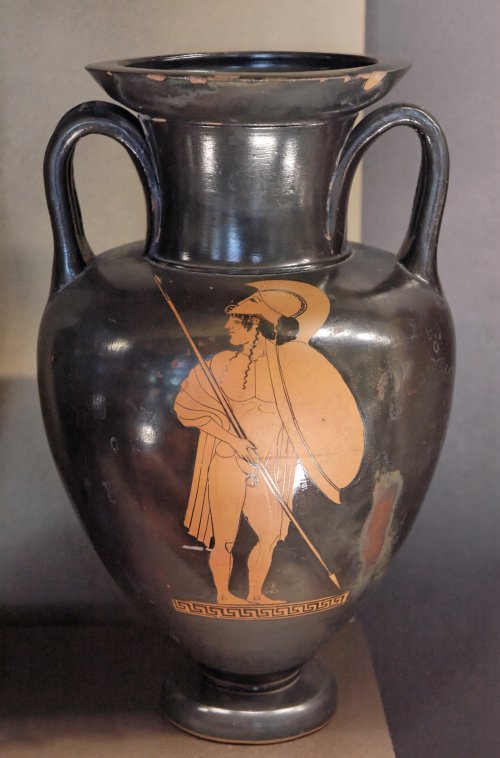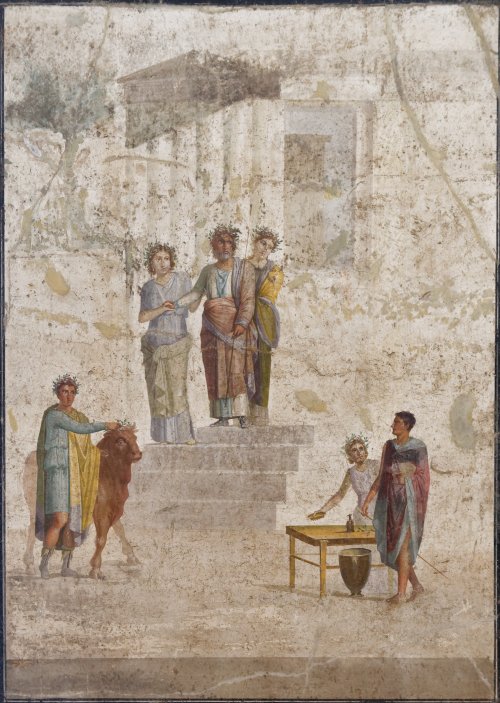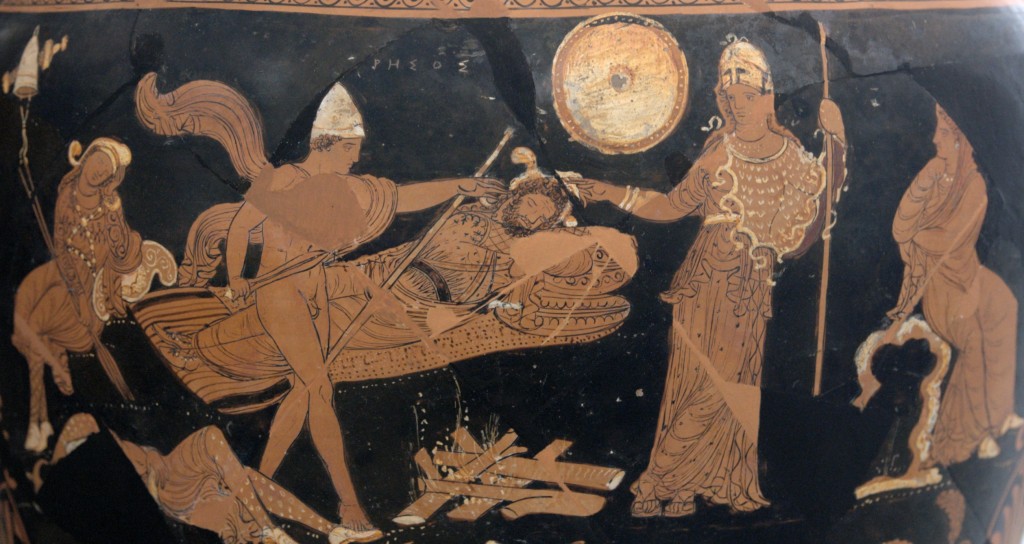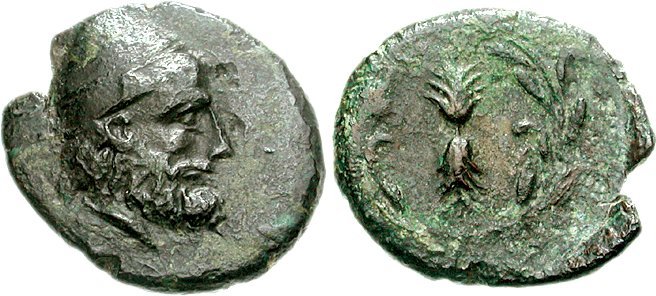A guest post by Sarah Scott
This month’s Core Vocab word—from Gregory Nagy’s book The Ancient Greek Hero in 24 Hours[1]—is kerdos [κέρδος], plural kerdea [κέρδεα] which he glosses as ‘gain, profit; desire for gain; craft employed for gain; craftiness; craft’.
I wondered in what contexts the word might occur—and whether the ancient Greeks saw it as a positive or negative attribute, or something in between. Here are a few passages where the word is used.
In Iliad 10 when Nestor has suggested a night raid on the Trojan camp, Diomedes replies:
Nestor, gladly will I visit the army of the hateful Trojans over against us, but if another will go with me I shall do so in greater confidence and comfort. When two men are together, one of them [225] may see some opportunity [kerdos] which the other has not caught sight of; if a man is alone he is less full of resource, and his thinking [noos] is weaker.
(Iliad 10.220–226, Sourcebook[2])
‘Νέστορ ἔμ᾽ ὀτρύνει κραδίη καὶ θυμὸς ἀγήνωρ 220
ἀνδρῶν δυσμενέων δῦναι στρατὸν ἐγγὺς ἐόντων
Τρώων: ἀλλ᾽ εἴ τίς μοι ἀνὴρ ἅμ᾽ ἕποιτο καὶ ἄλλος
μᾶλλον θαλπωρὴ καὶ θαρσαλεώτερον ἔσται.
σύν τε δύ᾽ ἐρχομένω καί τε πρὸ ὃ τοῦ ἐνόησεν
ὅππως κέρδος ἔῃ: μοῦνος δ᾽ εἴ πέρ τε νοήσῃ 225
ἀλλά τέ οἱ βράσσων τε νόος, λεπτὴ δέ τε μῆτις.
Of the volunteers, Odysseus is the one chosen. Was Diomedes suggesting him in his choice of words? The word kerdos seems to me to be a good fit to Odysseus’ particular skills!
 As part of his advice to Antilokhos, just before the passage about the sēma Nestor says:
As part of his advice to Antilokhos, just before the passage about the sēma Nestor says:
[320] If a man go wide in rounding this way and that, whereas a man of craft [kerdos] may have worse horses, but he will keep them well in hand when he sees the turning-post [terma]; he knows the precise moment [325] at which to pull the rein, and keeps his eye well on the man in front of him.
(Iliad 23.319–325, Sourcebook)
ἀλλ᾽ ὃς μέν θ᾽ ἵπποισι καὶ ἅρμασιν οἷσι πεποιθὼς
ἀφραδέως ἐπὶ πολλὸν ἑλίσσεται ἔνθα καὶ ἔνθα, 320
ἵπποι δὲ πλανόωνται ἀνὰ δρόμον, οὐδὲ κατίσχει:
ὃς δέ κε κέρδεα εἰδῇ ἐλαύνων ἥσσονας ἵππους,
αἰεὶ τέρμ᾽ ὁρόων στρέφει ἐγγύθεν, οὐδέ ἑ λήθει
ὅππως τὸ πρῶτον τανύσῃ βοέοισιν ἱμᾶσιν,
ἀλλ᾽ ἔχει ἀσφαλέως καὶ τὸν προὔχοντα δοκεύει. 325
Antilokhos proceeds to bend the rules of the race and nearly drives Menelaos off the track, thereby gaining the advantage. Diomedes wins first place.
Next after him came in Antilokhos of the race of Neleus, [515] who had passed Menelaos by craft [kerdos] and not by the fleetness of his horses
(Iliad 23.514–516, Sourcebook)
τῷ δ᾽ ἄρ᾽ ἐπ᾽ Ἀντίλοχος Νηλήϊος ἤλασεν ἵππους
κέρδεσιν, οὔ τι τάχει γε, παραφθάμενος Μενέλαον: 515
ἀλλὰ καὶ ὧς Μενέλαος ἔχ᾽ ἐγγύθεν ὠκέας ἵππους.
In the Odyssey the term occurs more frequently. I’ve picked just one example, after Odysseus has made up a lying tale to Athena on the shore of Ithaka:
“He must be indeed a shifty lying character,” said she, “who could surpass you in all manner of craft [kerdos] even though you had a god for your antagonist. Daring that you are, full of guile, unwearying in deceit [atē], [295] can you not drop your tricks and your instinctive falsehood, even now that you are in your own country again? We will say no more, however, about this, for we both of us know craftiness [kerdos] upon occasion—you are the best counselor and orator among all humankind, while I for diplomacy and crafty ways [kerdea] have fame [kleos] among the gods.
(Odyssey 13.291–299, Sourcebook)
κερδαλέος κ᾽ εἴη καὶ ἐπίκλοπος ὅς σε παρέλθοι
ἐν πάντεσσι δόλοισι, καὶ εἰ θεὸς ἀντιάσειε.
σχέτλιε, ποικιλομῆτα, δόλων ἆτ᾽, οὐκ ἄρ᾽ ἔμελλες,
οὐδ᾽ ἐν σῇ περ ἐὼν γαίῃ, λήξειν ἀπατάων
μύθων τε κλοπίων, οἵ τοι πεδόθεν φίλοι εἰσίν. 295
ἀλλ᾽ ἄγε, μηκέτι ταῦτα λεγώμεθα, εἰδότες ἄμφω
κέρδε᾽, ἐπεὶ σὺ μέν ἐσσι βροτῶν ὄχ᾽ ἄριστος ἁπάντων
βουλῇ καὶ μύθοισιν, ἐγὼ δ᾽ ἐν πᾶσι θεοῖσι
μήτι τε κλέομαι καὶ κέρδεσιν
I noticed that the word is also used by the suitors to apply to Penelope but I haven’t quoted the passages here: maybe someone would like to find those examples and see what is going on in those passages.
Pindar seems to use the word more often in the plural, in the sense of gains. Here are a couple of examples from the conclusions of poems:
Do not be deceived, my friend [philos], by glib profit-seeking [kerdea]. The loud acclaim of renown that survives a man is all that reveals the way of life of departed men to storytellers and singers alike.
(Pindar Pythian 1.92–94, translated by Diane Arnson Svarlien, from Perseus; with other Core Vocab words added for reference.)
ὴ δολωθῇς, ὦ φίλος, κέρδεσιν εὐτράπλοις: ὀπιθόμβροτον αὔχημα δόξας
οἶον ἀποιχομένων ἀνδρῶν δίαιταν μανύει
καὶ λογίοις καὶ ἀοιδοῖς:
Nevertheless we embark on bold endeavors, [45] longing for many deeds, for our limbs are bound by shameless hope, while the streams of foresight lie far away. But we must hunt for due measure in our love of gain [kerdea]. The madness of unattainable desires is too sharp.
(Pindar Nemean 11.44–48 translated by Diane Arnson Svarlien, from Perseus.)
ἀλλ᾽ ἔμπαν μεγαλανορίαις ἐμβαίνομεν,
ἔργα τε πολλὰ μενοινῶντες: δέδεται γὰρ ἀναιδεῖ 45
ἐλπίδι γυῖα: προμαθείας δ᾽ ἀπόκεινται ῥοαί.
κερδέων δὲ χρὴ μέτρον θηρευέμεν:
ἀπροσίκτων δ᾽ ἐρώτων ὀξύτεραι μανίαι.
 But the ‘craftiness’ sense of the word in the singular occurs in Pythian 4 when Jason addresses Pelias, Perhaps it is one possible characteristic of a hero. Both Jason and Odysseus undertake voyages and are eloquent in their speeches:
But the ‘craftiness’ sense of the word in the singular occurs in Pythian 4 when Jason addresses Pelias, Perhaps it is one possible characteristic of a hero. Both Jason and Odysseus undertake voyages and are eloquent in their speeches:
And Jason, with his soothing voice distilling gentle language, laid the foundation of skillful [sopha] words: “Son of Poseidon, Cleaver of the Rock, the minds [phrenes] of mortals are all too swift [140] to praise crafty gain [kerdos] rather than justice [dikē], although they are moving towards a harsh reckoning. But you and I must govern our tempers rightly and weave our future prosperity.”
(Pindar Pythian 4.136–141) translated by Diane Arnson Svarlien, from Perseus; with other Core Vocab words added for reference.)
…πραῢν δ᾽ Ἰάσων
μαλθακᾷ φωνᾷ ποτιστάζων ὄαρον
βάλλετο κρηπῖδα σοφῶν ἐπέων: ‘παῖ Ποσειδᾶνος Πετραίου,
ἐντὶ μὲν θνατῶν φρένες ὠκύτεραι
κέρδος αἰνῆσαι πρὸ δίκας δόλιον, τραχεῖαν ἑρπόντων πρὸς ἔπιβδαν ὅμως: 140
ἀλλ᾽ ἐμὲ χρὴ καὶ σὲ θεμισσαμένους ὀργὰς ὑφαίνειν λοιπὸν ὄλβον.
Plato also relates kerdos with injustice.:
For if we are just [dikaioi], we shall, it is true, be unscathed by the gods, but we shall be putting away from us the profits [kerdea] of injustice [a-dikē]; but if we are unjust [=be a-dikoi], we shall win those profits [verb of kerdos], and, by the importunity of our prayers, when we transgress and sin, we shall persuade them and escape scot-free.
(Plato Republic 2.366a, translated by Paul Shorey, on Perseus; with additional Core Vocab words added for reference)
δίκαιοι μὲν γὰρ ὄντες ἀζήμιοι μόνον ὑπὸ θεῶν ἐσόμεθα, τὰ δ᾽ ἐξ ἀδικίας κέρδη ἀπωσόμεθα: ἄδικοι δὲ κερδανοῦμέν τε καὶ λισσόμενοι ὑπερβαίνοντες καὶ ἁμαρτάνοντες, πείθοντες αὐτοὺς ἀζήμιοι ἀπαλλάξομεν.
I found some passages in Thucydides. Here is one example:
[2] After Minos had established his navy, communication by sea became more general. For, he having expelled the marauders when he colonised the greater part of the islands, [3] the dwellers on the sea-coast began to grow richer and to live in a more settled manner; and some of them, finding their wealth increase beyond their expectations, surrounded their towns with walls. The love of gain [kerdea] made the weaker willing to serve the stronger, and the command of wealth enabled the more powerful to subjugate the lesser cities. [4] This was the state of society which was beginning to prevail at the time of the Trojan War.
(Thucydides The Peloponnesian War 1.8,translated by Benjamin Jowett, on Perseus)
[2] καταστάντος δὲ τοῦ Μίνω ναυτικοῦ πλωιμώτερα ἐγένετο παρ᾽ ἀλλήλους (οἱ γὰρ ἐκ τῶν νήσων κακοῦργοι ἀνέστησαν ὑπ᾽ αὐτοῦ, ὅτεπερ καὶ τὰς πολλὰς αὐτῶν κατῴκιζε), [3] καὶ οἱ παρὰ θάλασσαν ἄνθρωποι μᾶλλον ἤδη τὴν κτῆσιν τῶν χρημάτων ποιούμενοι βεβαιότερον ᾤκουν, καί τινες καὶ τείχη περιεβάλλοντο ὡς πλουσιώτεροι ἑαυτῶν γιγνόμενοι: ἐφιέμενοι γὰρ τῶν κερδῶν οἵ τε ἥσσους ὑπέμενον τὴν τῶν κρεισσόνων δουλείαν, οἵ τε δυνατώτεροι περιουσίας ἔχοντες προσεποιοῦντο ὑπηκόους τὰς ἐλάσσους πόλεις. [4] καὶ ἐν τούτῳ τῷ τρόπῳ μᾶλλον ἤδη ὄντες ὕστερον χρόνῳ ἐπὶ Τροίαν ἐστράτευσαν.
This could refer simply to material gain, but I can’t help noticing that juxtaposition with the Trojan War, which was, as we know, conquered not only by fighting but also by the craftiness of Odysseus and the Trojan Horse. And is that connection with Crete coincidental?
I discovered in the LSJ (on Perseus) that kerdos is cognate with Old Irish cerd ‘art’, ‘craft’, and Welsh cerdd ‘craft’ or ‘music’—which seem to relate to the positive connotations of the word, while many of the Greek passages I have looked at so far seem to be ambivalent or suggest greed or craftiness. But there may be other passages where the word is used in a more constructive sense.
I have illustrated the word with heroes featured in these texts. How might you choose to illustrate it?
I hope we can share other passages to further explore this word and how it was regarded by the ancient Greeks.
Members of the community can join the discussion in this forum thread.
References
[1] Nagy, Gregory. 2013. The Ancient Greek Hero in 24 Hours. Cambridge, MA: Harvard University Press, 2013
https://nrs.harvard.edu/urn-3:hul.ebook:CHS_NagyG.The_Ancient_Greek_Hero_in_24_Hours.2013
[2] Sourcebook: The Ancient Greek Hero in 24 Hours Sourcebook of Original Greek Texts Translated into English, Gregory Nagy, General Editor.
Other texts via Perseus, as linked above.
Image credits
Jastrow (photo, 2006). Tithonos Painter: Antilochus. Side A from an Attic red-figure neck-amphora, c 470 BCE, Louvre. public domain
Marie-Lan Nguyen (photo). Pelias, king of Iolcos, stops on the steps of a temple as he recognises young Jason by his missing sandal. Fresco, Naples, 1st century CE. public domain.
Bibi Saint-Pol (photo, 2008). Darius Painter. “Rhesos krater”, Apulian red-figure krater, c 340BCE, side A: Odysseus and Diomedes stealing the horses of Rhesus. Alltes Museum, Berlin. public domain
Classical Numismatic Group. Coin from Ithaka circa 300–191 BCE. Head of Odysseus right, wearing pileus / Thunderbolt within wreath. Creative Commons CC BY-SA 3.0, via Wikimedia Commons
Note: Images have been selected from pictures that are freely available with open source or Creative Commons licenses or from photographs sent in by community members for the purpose. The images in this post are intended to suggest the subject, rather than illustrate exactly—as such, they may be from other periods, subjects, or cultures. Attributions are based where possible by those shown by museums, or on Wikimedia Commons, at the time of publication on this website.
___
Sarah Scott has a degree in Language from the University of York where she specialized in philology, and has worked as an editor, technical author, and documentation manager. She is the Associate Producer for the HeroesX project, and one of the Executive Editors of the HeroesX Sourcebook. She is an active participant and member of the editorial team in Kosmos Society, with a particular interest in content development, document management, word studies, language learning, comparative linguistics, and digital humanities.

